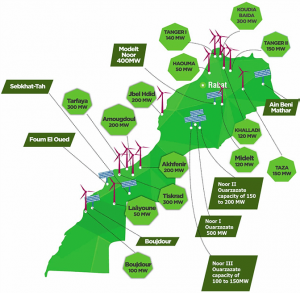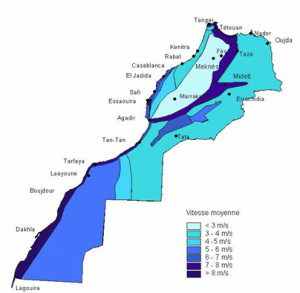Young Green Fabian Wagner attended the COP 22 negotiations in Marrakesh and found that despite the host’s eagerness to project itself as a constructive force in the fight against climate change, its policies in other areas raise serious concerns – not least the levels of repression around the question of Western Sahara.
Morocco certainly did not hold back in terms of advertising its efforts to become a country powered by renewable energy during the COP22. Only the most oblivious of visitors could have missed the banners at the airport, posters in the city, ads on horse carriages, and stickers on cars. Wind power, solar power — Morocco is transitioning towards clean energy at a very quick pace.
Africa’s forgotten conflict
Sounds great? Here’s the downside: Africa has a largely forgotten and ignored conflict right on the doorsteps of Europe. After colonial Spain retreated from Western Sahara in the ‘70s, Morocco quickly imposed itself following a bit of a struggle with Mauritania which ended in its favour, and subsequently annexed the entire territory as its “Southern Provinces”. The UN installed a peacekeeping mission there (without a mandate to observe human rights in the region) and spent the next almost half a century repeatedly, and without success, calling for a referendum on the independence of resource rich territory, and its identity as the Sahrawi Arab Democratic Republic. It was interesting to see how much effort Morocco invested into presenting this as the “African COP”, despite Morocco being the only country in Africa that is not a member of the African Union (AU) — Morocco left after the AU acknowledged the independence of Western Sahara. In the run-up to the COP in Marrakech the topic naturally attracted slightly more attention than usually, but very little criticism was raised openly for obvious reasons. Morocco’s reaction to any kind of criticism of its Western Sahara politics is brusque. When the UN Secretary General called the situation out for what it is — an illegal occupation — Morocco expelled the entire peacekeeping mission. A subsequent apology from the Secretary General was still not enough to re-admit the entire mission. Moreover, our own Green activists from several of the Federation of Young European Greens’ (FYEG) member organisations have been evicted from or denied entry to both Western Sahara and Morocco, when trying to report from the ground. Plain-clothes and uniformed police are everywhere, as FYEG’s activists witnessed first-hand, when trying to work on unrelated, but still undesirable for the Moroccan government, media projects. Under these circumstances FYEG, the Western Sahara Support Committees from around the world, the Sahrawis themselves, and other civil society organisations and movements like the teachers group we met in Marrakech found it very difficult to raise concerns about the topic of Western Sahara while being present for COP22 in Morocco.
Inside the COP22 bubble
Inside the COP, a completely different picture. Panellists hail the Moroccan efforts to become carbon-neutral and Morocco presents its projects in huge pavilions, aligning itself with other big players in the field of renewable energies. But Morocco’s clean energy is quite dirty. Much of it is produced and developed on territory that is not Moroccan, but Sahrawi. Western Sahara Resource Watch, an NGO working on highlighting the resource-related struggle of the Sahrawi people, published a damning report describing how much of this clean energy is used by Morocco to power the plunder of Sahrawi resources — phosphate and fish in particular. Many of the newly build solar and wind power plants are located in the immediate vicinity of mines and ports and those facilities in turn get the vast majority of their energy from Morocco’s new, renewable energy plants in Western Sahara.
Europe is not oblivious to these events. Both economically and politically the EU and Morocco are collaborating on plenty of projects and — similarly to the situation at the other end of the continent, in Turkey — one cannot help but wonder who is dependent on whom in this relationship. Europe considers Morocco an anchor of stability in the region. The Arab Spring — instead of leading to civil war and chaos like in Libya and Syria — resulted in some reforms of the Moroccan system and slightly more democratic participation in what remains an oppressive kingdom. Europe directly collaborates with the Moroccan security forces to block the path of refugees and other migrants from sub-Saharan Africa, in particular on the borders of the Spanish enclaves in Morocco: Ceuta and Melilla. The result is a shift in responsibility for refugees from Europe to Morocco, as the jointly administered border does not easily allow access to EU legislation. But given what we see in Western Sahara, given how our own FYEG activists and other movements, like the teachers’ struggle in Marrakech, experienced the ubiquity of the secret police, Morocco’s poor human rights and freedom of press record both on its own territory and even worse in Western Sahara, Europe should seriously ask itself if Morocco is really the best or even an adequate partner.
Partners in crime
Similarly, in the economic sphere Europe is complicit in the occupation of Western Sahara. As the WSRW report explains, it is Siemens — a German corporation — which is building the windmills in the occupied territories. Siemens is right, wind is no finite resource and thus does not hamper the ability of future generations of Sahrawis living under self-determination on their territory to live up to their full potential. But phosphate is, and so is fish (if fishing is conducted in the unsustainable manner it tends to be conducted in in our time). Siemens-generated electricity is used to exploit these non-renewable resources, rather than to power poor households in Morocco or Western Sahara. Also one cannot simply omit the point that any business in the occupied territories contributes to the normalisation and recognition of Morocco’s sovereignty over the territory it illegally occupies. Every company or individual that asks Morocco for permission for its activities in Western Sahara and accepts the fact that Morocco is the entity granting this permission, legitimises Morocco’s authority with regards to Western Sahara. Therefore any activity in these areas must be halted at least until the status is clarified. Communicating this point clearly and unequivocally is needed to push Morocco to finally implement the long-promised referendum on Sahrawi independence, which it has so far prevented.
Instead Europe is playing with this unstable situation. Not only for the benefit of its companies, like Siemens, but also to greenwash its energy sources. At COP22, Germany, France, Spain, and Portugal signed a roadmap agreement with Morocco to work towards renewable energy trade between Morocco and the EU. For two weeks Morocco has been openly bragging about its renewable energy projects, which are to a significant extent situated in Western Sahara, not in Morocco — and the business is growing, with Western Sahara being a sunny, windy area that is ideally suited to produce renewable energy from wind and sun en masse. There is no way the EU could not have noticed. Investing in Western Sahara under the various agreements between Morocco and the EU is illegal. Courts across Europe have made this clear on several occasions, including the 2015 landmark ruling on the inapplicability of the EU-Morocco trade agreement to Western Sahara territory and it will be confirmed soon in the upcoming rulings on trade and fishery agreements. It is up to each and every single government in Europe, as well as the EU as a whole to make sure their companies abide by international law, but it is even more up to the governments themselves to respect court decisions, international law, and the many moral guidelines our continent issues for its Southern neighbours, including human rights and democracy.


Fig. 1 (left): A map featured on the COP22 website shows the planned and realised renewable energy projects on what Morocco considers its territory. A significant amount of the projects are located in Western Sahara, which is not marked on this map, as usual in Moroccan maps.
Fig. 2 (right): Wind energy is a lucrative business with this map from the Moroccan Investment Development Agency clearly showing the potential of Western Saharan territory in this sector.
Clean energy = Green energy?
Beyond the obvious need for Europe to stand up for what it preaches, this situation puts us Greens in a difficult situation. Investment in renewables is a good thing. We need a lot more of it and every big deal encourages the almighty market to shift towards greener ways to power our lives. But how Green really is this energy from Morocco? Being Green is not only about the environment; social and human rights are an intricate part of the Green ideology. We should not allow environmental concerns to override our commitment to human rights. The only sustainable solution for this conflict is for the EU to use its power to push for the long-promised referendum and negotiate access to Western Sahara resources with those whom they belong to: the Sahrawi people. COP22 would have been a great opportunity for that, but Europe missed it. We as Greens can only welcome that this event was labelled the “COP of implementation”, because implementation — action — is what we urgently need if we want to stay below 1.5°C global warming. The agreement between the four EU countries and Morocco shows there has been some action, though mainly on bi- or small multilateral levels, rather than on the big stage where many questions remained unsolved. In these seemingly very technical agreements between two or more states in particular — many of which happen away from public attention or scrutiny — we Greens in Europe need to make sure that both sides of the Green ideology are served: environmentalism and social/global justice. This is what distinguishes us from other parties who tend to use either one of them, especially the former one, while neglecting the social aspect, in order to greenwash their policies. Our planet and our climate however do not need one-dimensional greenwashing, but honest, truly multidimensional Green politics.
That is a portfolio only we as Greens have on offer.
